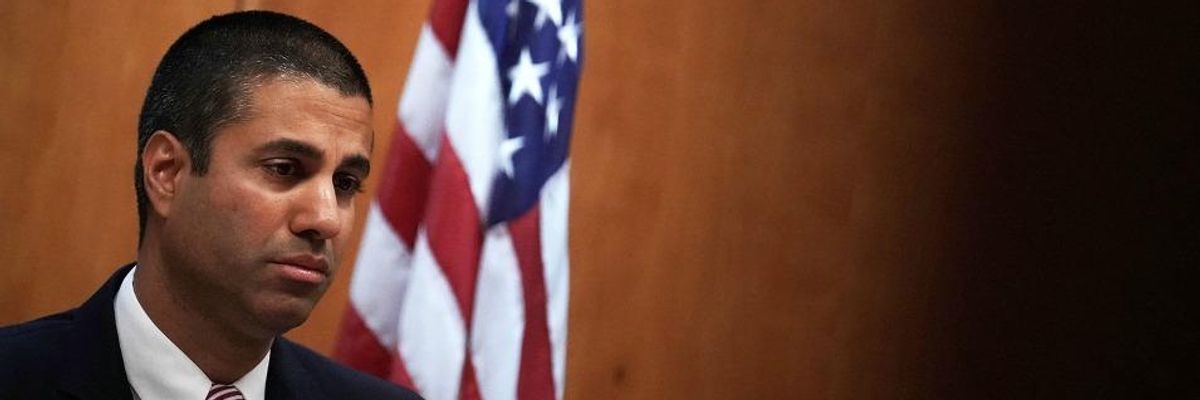After spending a year claiming that the Federal Communications Commission's (FCC) public comment system had been hacked while the agency was gathering feedback on net neutrality protections--resulting in the loss of comments in favor of the rule--commission chair Ajit Pai was forced to admit on Tuesday that no such breach had taken place, just before a report on the matter was released by the FCC's inspector general.
The agency has maintained since last summer that its comment system was targeted by multiple "distributed denial-of-service attacks" (DDoS) on May 7, 2017, just after TV host John Oliver urged his audience to comment in favor of protecting net neutrality.
Fight for the Future has accused the FCC of "invent[ing] a fake DDoS attack to cover up the fact that they lost comments from net neutrality supporters."
In his statement on Tuesday, Pai blamed the accusations of hacking on former chief information officer David Bray, who was appointed by the Obama administration and who left the agency a year ago, suggesting that Bray lied about an attack to make it seem as though an inaccurate number of people were trying to comment in favor of net neutrality.
Pai also said that the upcoming inspector general's report would put to rest claims--which he referred to as a "conspiracy theory"--that he had spread the falsehood knowingly. But as Devin Coldeway at Techcrunchwrote, the fact that the chairman spent a year pushing the DDoS attack narrative raised serious questions about Pai's claims:
At any time in the last year, especially after Bray had departed, it would have been, if not simple, then at least simpler than maintaining its complex act of knowledgelessness, to say that the CIO had made an error and there was no attack. Nothing like that has come out of the agency.
One must assume the agency had reviewed the data. Bray left a long time ago; why did these subordinates of his fail to speak out afterwards? If the FCC had its doubts, why did it not say so instead of risking withering criticism by avoiding the question for months on end? When and why did Pai or his office develop the idea that the report was inaccurate, if not when it was being disseminated?
FCC commissioner Jessica Rosenworcel--who has forcefully defended net neutrality and was one of two members of the panel to vote in favor of protecting the rules in December--said the new report confirms that the comments system crashed not because of hackers, but because of overwhelming support for the open internet.
"The Inspector General Report tells us what we knew all along: the FCC's claim that it was the victim of a DDoS attack during the net neutrality proceeding is bogus," said Rosenworcel. "What happened instead is obvious--millions of Americans overwhelmed our online system because they wanted to tell us how important internet openness is to them and how distressed they were to see the FCC roll back their rights. It's unfortunate that this agency's energy and resources needed to be spent debunking this implausible claim."
Last summer, Sen. Ron Wyden (D-Ore.) slammed Pai for his lack of transparency after the FCC declined a Freedom of Information Act (FOIA) request about the incident from Gizmodo. The agency had claimed the alleged DDoS attack "did not result in written documentation."
"If the FCC did suffer a DDoS attack and yet created no written materials about it, that would be deeply irresponsible and cast doubt on how the FCC could possibly prevent future attacks," Wyden toldGizmodo, adding that the FCC's refusal raised "legitimate questions about whether the agency is being truthful when it claims a DDoS attack knocked its commenting system offline."
On Twitter, Sen. Catherine Cortez-Masto (D-Nev.) joined Rosenworcel in applauding the confirmation that the FCC had lied about the attack--and suggested the Senate would soon grill Pai over his statements over the past year.

